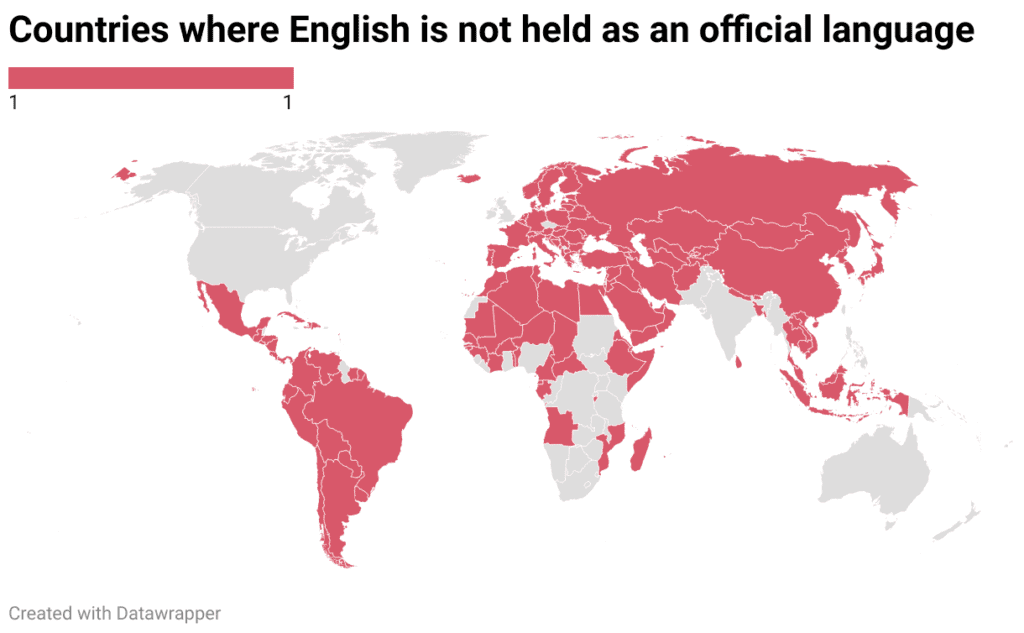Contents
Toggle
Meet David De’ Ath, founder, editor, and writer at Wonderful World English. With his extensive background as an English teacher, David provides valuable insights and practical tips on ESL for students and teachers alike.
Teaching English abroad in 2025 offers an exciting opportunity for those who want to explore new cultures while making a meaningful impact.
Understanding the requirements for teaching, choosing the right destination, and obtaining the necessary credentials are crucial steps to ensure a successful experience.
With so many countries looking for qualified English teachers, it’s important to know where to start and how to navigate this journey.
Many aspiring teachers feel overwhelmed by the process, but breaking it down into manageable steps can simplify the pathway to teaching abroad.
From preparing for the move to developing effective teaching strategies, a well-rounded approach will help newcomers adapt quickly and thrive in their new roles.
This article will lay out essential tips to guide anyone looking to embark on this rewarding experience.
By staying informed and prepared, future teachers can unlock a world of possibilities and enrich their lives and the lives of their students.
Whether she aims to travel the globe or dive deep into one culture, the journey begins with the right knowledge and resources.
Key Takeaways
- Understanding requirements is key to successful teaching abroad.
- Selecting the right country impacts the overall experience.
- Effective preparation enhances classroom effectiveness and personal growth.
Requirements for Teaching English Abroad
Teaching English abroad involves specific qualifications, certifications, and legal considerations that vary by country.
Knowing these requirements helps one prepare effectively for this rewarding opportunity.
Qualifications and Certifications
Most countries require teachers to hold at least a bachelor’s degree.
Many positions prefer candidates with a degree in education, English, or related fields.
A recognized certification, such as TESOL or TEFL, is often necessary.
These programs provide essential teaching skills and knowledge of language acquisition.
It’s important to choose a certification course that includes a practicum.
This hands-on training helps build confidence and practical teaching skills.
Additionally, some countries have their own specific certification requirements.
Researching the destination country’s criteria is crucial before applying for teaching positions.
Visa and Legal Requirements
Obtaining the correct visa is a vital step in teaching English abroad.
Most countries require a work visa, which may need specific documents.
These documents can include a job offer, proof of qualifications, and sometimes a criminal background check.
Some employers may assist with visa applications.
Ensuring all legal requirements are met is essential.
Failure to comply can lead to legal issues or deportation.
It’s also wise to familiarize oneself with local laws and education regulations.
This knowledge ensures smooth integration into the new environment.
Language and Cultural Proficiency
Understanding the local culture and language greatly enhances the teaching experience.
While English may be the primary language of instruction, knowing basic phrases in the local language is beneficial.
Many countries appreciate when foreigners make an effort to learn their language.
This can foster better relationships with students and colleagues.
Cultural proficiency includes understanding social norms, traditions, and teaching styles.
Adapting to these aspects can improve classroom management and student engagement.
Participating in local events or community groups can provide valuable insights into the culture.
This immersion enriches both personal and professional experiences during the teaching assignment.

Selecting the Right Country
Choosing the right country to teach English abroad is crucial for a successful experience.
Important factors include the demand for English teachers, economic conditions, and the cultural environment.
Demand for English Teachers
The demand for English teachers varies greatly by country.
Regions like East Asia, particularly South Korea and China, often have a high need for qualified teachers.
Japan and Taiwan also maintain strong demand due to their education systems focusing on English proficiency.
In Europe, countries like Spain and Poland are popular for English teaching opportunities.
They attract many teachers with their appealing cultures and lifestyles.
Researching job availability in a specific country can help in making a wise choice.
Economic Considerations
Economic factors play a significant role in selecting a country.
Salary expectations, cost of living, and job benefits must be taken into account.
For instance, South Korea often offers competitive salaries, making it easier to save money.
In contrast, teaching in countries like Costa Rica may provide lower salaries but also lower living costs.
It is essential to evaluate benefits such as health insurance, housing assistance, and airfare reimbursement, as these can affect overall financial stability while living abroad.
Cultural and Lifestyle Factors
Cultural aspects and lifestyle preferences greatly influence the decision on where to teach.
Prospective teachers should consider language barriers, local customs, and available social activities.
Countries like Spain and Italy offer rich cultural experiences with their vibrant lifestyles, history, and cuisine.
Teaching in these environments can provide an enriching experience outside the classroom.
Safety, healthcare quality, and the friendliness of locals are crucial factors to examine.
He or she should prioritize personal comfort and interests when selecting a destination.

Obtaining the Necessary Teaching Credential
To teach English abroad, individuals must acquire the right teaching credentials.
This often involves completing a TEFL certification.
The choice of certification program and its mode of instruction can impact job opportunities and requirements in different countries.
TEFL Certification Programs
TEFL certification programs are essential for those looking to teach English internationally.
These programs focus on teaching English as a foreign language and typically require completion of a designated number of hours.
A standard requirement is a 120-hour TEFL course. Some programs may also include an in-person component.
Key areas covered in these courses often include lesson planning, classroom management, and teaching strategies.
Many employers value hands-on experience, so finding programs that include teaching practice can be beneficial.
Additionally, prospective teachers should research specific country requirements for teaching credentials, as they can vary widely.
Online vs. In-Class Certifications
When choosing a TEFL certification, individuals can opt for online courses, in-class programs, or a combination of both.
Online certifications offer flexibility and convenience, allowing students to learn at their own pace.
This can be ideal for those with busy schedules or those who are already abroad.
In-class programs provide a more immersive experience.
These courses often involve direct interaction with instructors and peers, which can enhance learning.
Many teachers find that this format better prepares them for real classroom situations.
Those considering a hybrid option can gain the advantages of both worlds.
Ultimately, the choice depends on personal learning style, availability, and budget.
Accreditation and Recognition
Accreditation is a critical factor when selecting a TEFL program. Accredited programs are recognized and respected by employers.
It is essential for teachers to choose a program with a reputable accrediting body.
Recognized certification ensures that teachers meet international standards.
This can lead to better job prospects and opportunities.
Prospective teachers should check if the certification is accepted in their desired teaching location. Some countries have specific requirements that differ from others.
Researching the accreditation status and industry recognition of any chosen program can save future teachers from potential issues when applying for jobs abroad.
Related: How to Get TEFL Certification: Your Step-by-Step Guide

Finding Employment
Finding a teaching job abroad involves using various resources effectively.
By exploring job boards, recruitment agencies, and networking opportunities, one can increase the chances of landing a suitable position.
Job Boards and Listings
Job boards are essential for anyone looking to teach abroad.
They provide a centralized platform where job seekers can find numerous listings in one place.
Websites like Teach Away and Go Overseas regularly post new opportunities.
Seek out job boards that focus on specific regions or countries, as they may offer more tailored listings.
For example, some boards specialize in Asia while others cover Europe. Each listing typically includes job requirements, salary details, and application instructions.
Regularly checking these sites allows job seekers to stay informed about new openings.
Setting up email alerts can also help candidates respond quickly to new listings.
Recruitment Agencies
Recruitment agencies simplify the job search process for teaching positions abroad.
They often have established relationships with schools and know the local job market well.
Agencies like International TEFL Academy offer services to match candidates with suitable jobs.
These agencies can provide valuable support during the application process.
They may assist with resume reviews and interview preparation.
Some agencies even offer placement guarantees, giving candidates more confidence.
It’s essential to choose a reputable agency. Candidates should read reviews and ensure the agency has a track record of successful placements.
Engaging with an agency can save time and offer access to exclusive job postings.
Networking and Community
Networking is a powerful tool for finding teaching jobs abroad.
Connecting with others in the field can lead to valuable job leads.
Joining groups on social media platforms like LinkedIn helps build a professional network.
Participating in online forums or local meetups can also expand connections.
Engaging with alumni from TEFL programs or teacher training can be especially beneficial.
They often share job opportunities or recommend schools.
Attending job fairs or expos focused on teaching abroad can enhance visibility.
Meeting recruiters face-to-face allows for personal connections that may lead to job offers.
Building a strong network can open doors that traditional job searching may not.
China is one of the most popular destinations for teaching English abroad and boasts an excellent quality of life and high salaries for new and experienced teachers alike.
For more information on teaching in China, click the link below!
Related: How to Teach in China: The Essential Guide

Preparing for the Move Abroad
Moving abroad to teach English involves several essential preparations.
It is crucial to consider logistics, cultural experiences, and financial matters to ensure a smooth transition.
Relocation Logistics
Planning the logistics of a move is vital.
This includes securing housing, arranging transportation, and managing important documents.
Housing options can vary widely. Research neighborhoods that suit personal lifestyle and budget. Finding temporary accommodation may be wise until settling in.
Next, transportation needs to be addressed. She should look into flight options and local transport systems upon arrival.
Lastly, ensure all important documents such as visas, TEFL certifications, and personal identification are in order. Keeping these documents organized can make the transition smoother.
Cultural Acclimatization
Adjusting to a new culture can be both exciting and challenging.
Understanding local customs and traditions is essential for a successful experience.
To start, researching the language spoken in the new country can help.
Even learning basic phrases can foster goodwill among locals.
Additionally, embracing local foods and social customs can aid in cultural integration.
Participating in community events or local tours can improve cultural understanding.
It’s also important to find support networks.
Joining expat groups online or in-person can provide valuable tips and a sense of community.
Financial Planning
Financial planning is necessary for living abroad. Budgeting for expenses before leaving can reduce stress later.
First, she should assess the cost of living in the destination country.
This might include rent, utilities, and daily expenses.
Opening a local bank account can simplify transactions.
She should also research currency exchange rates to understand how far her funds will go.
Lastly, creating a financial buffer for emergencies is wise.
Saving a few months’ worth of living expenses can provide peace of mind during the transition.

Classroom and Teaching Strategies
Effective classroom strategies are essential for success when teaching English abroad.
This section explores curriculum development, teaching methods, and classroom management techniques that will enhance the learning experience.
Curriculum Development
Curriculum development is a critical aspect of teaching English abroad.
It involves aligning lesson plans with the needs and proficiency levels of students.
Teachers should conduct assessments to identify student abilities at the start of the course.
This allows them to craft lessons that build on existing skills while introducing new concepts.
Including a variety of materials, such as textbooks, online resources, and real-world texts, will engage students.
Additionally, teachers should incorporate cultural elements from the target country to make lessons more relevant and interesting.
A well-structured curriculum should also provide flexibility.
This enables teachers to adjust lessons based on student feedback and performance.
Teaching Methods and Techniques
Various teaching methods and techniques can be utilized to engage students effectively.
Communicative Language Teaching (CLT) encourages interaction among students, promoting practical language use.
Incorporating group work and pair activities fosters collaboration.
Role-playing scenarios can also help students practice real-life conversations.
Visual aids like charts and videos enhance understanding and retention of new vocabulary and grammar.
Technology, such as language-learning apps, can provide additional practice outside the classroom.
Additionally, incorporating games and competitions can make learning enjoyable.
This approach motivates students and promotes a positive classroom atmosphere.
Classroom Management
Classroom management is crucial for maintaining a productive learning environment.
Establishing clear rules and expectations at the start sets the tone for the classroom.
Positive reinforcement can be effective.
Praising students for good behavior encourages a respectful and focused atmosphere.
Strategies like grouping students can help in managing diverse learning styles.
Mixed-ability groups allow for peer support.
Effective teachers also adapt to classroom dynamics.
They should be observant and ready to intervene when necessary.
This includes redirecting conversations or addressing disruptive behaviors promptly.
By using consistent routines and maintaining a structured environment, teachers can promote effective learning.
Check out the video below for some tips and insights into how to succeed as a new teacher!
Embracing Technology in Teaching
Modern teaching requires adapting to new tools and methods.
Technology enhances the learning experience and helps teachers engage their students more effectively.
Digital Learning Tools
Digital learning tools are essential for teaching English abroad.
They provide interactive and engaging experiences for students.
Apps like Duolingo and Babbel help learners practice language skills through games and quizzes.
Additionally, resources such as Quizlet allow teachers to create flashcards and quizzes, making vocabulary retention easier.
Teachers can use platforms like Nearpod to create interactive lessons that adjust to student needs.
These tools support diverse learning styles.
Visual learners benefit from videos, while auditory learners thrive in discussion-based settings.
Integrating digital tools can make lessons more effective and enjoyable.
Online Teaching Platforms
Online teaching platforms play a crucial role in language instruction.
Websites like Zoom and Google Meet allow teachers to connect with students worldwide.
These platforms enable real-time feedback and interaction, essential for language practice.
Furthermore, platforms like Italki connect learners with professional tutors.
This gives students the chance to practice speaking with native speakers.
Teachers can also use sites such as Edmodo to create virtual classrooms.
This helps them share resources and manage assignments efficiently.
By embracing these platforms, teachers can broaden their reach and enhance learning outcomes.
Blended Learning Approaches
Blended learning combines traditional classroom methods with online instruction.
This approach provides flexibility for both teachers and students.
For instance, teachers might use online modules for homework while reserving class time for speaking practice.
Using a mix of online and in-person learning helps accommodate different paces and styles.
Students can revisit lessons through recorded sessions, improving retention.
Incorporating blended learning strategies not only increases engagement but also builds self-directed learning skills.
Students learn to manage their time effectively while receiving the support they need in the classroom.
This approach keeps learning dynamic and relevant.

Professional Development and Advancement
Professional development is vital for English teachers abroad. It enhances skills and opens new job opportunities.
Staying updated with teaching methods and engaging in leadership roles can significantly impact their careers.
Continued Education
Continued education plays a crucial role in a teacher’s growth.
Many abroad programs encourage teachers to pursue further qualifications, such as a Master’s degree in Education or TEFL certifications.
Online courses, webinars, and local workshops provide flexible options for busy educators.
Programs focused on language acquisition, classroom management, and cultural sensitivity are particularly beneficial.
Additionally, professional development courses offered by organizations can provide valuable insights and networking opportunities.
Teachers should consider these options to refine their skills and stay competitive.
Career Pathways Abroad
Teachers have various career pathways while working overseas.
Besides traditional classroom roles, many opportunities exist in curriculum development, adult education, and educational consultancy.
Positions in international schools often come with higher salaries and better benefits.
Teachers can also consider roles in language academies or online teaching platforms.
Moreover, positions in administrative roles such as coordinator or director are attainable with experience and further qualifications.
Each pathway requires different skills, so researching is essential before making a decision.
Leadership and Mentorship
Leadership and mentorship are integral to professional advancement.
Experienced teachers can take on leadership roles within their schools, leading training sessions or development workshops.
Additionally, mentorship programs allow seasoned educators to guide newcomers, fostering a supportive community.
This relationship benefits both mentors and mentees, enhancing teaching practices.
Joining professional organizations or online forums can provide additional networking opportunities.
Engaging in discussions, sharing experiences, and participating in advocacy for teachers can lead to growth and new opportunities.
We hope you have found value in this guide; feel free to reach out if you are in need of any assistance.
Have a wonderful day!
Image Attribution: All images licensed via canva.com





